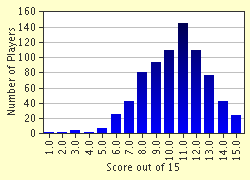Quiz Answer Key and Fun Facts
1. Polyandry is the practice in which many men, usually brothers, marry a single woman. In which of these countries is polyandry practiced?
2. In pre-1947 India, these people were excluded from the caste system. Although they performed important economic functions, such as shoemaking and cleaning the community, they existed outside the accepted ranking system, and as such were pariahs in the community.
3. This word refers to a system of growing crops based on gardening in which no plow is used.
4. This word refers to the tendency for a person to see one's own culture as the standard by which other cultures should be judged. It can also refer to the tendency to view one's own culture as superior to all other cultures.
5. This word refers to the smallest unit of meaning in a language.
6. Napoleon Chagnon wrote this book about a group of indigenous hunter gatherers living in South America. It was originally subtitled "The Fierce People."
7. The traditional myths, legends, beliefs, stories and customs of a people, transmitted within a culture orally, are referred to as:
8. A counteraction is:
9. The Maasai people in Africa are
10. Two other names for the Bushmen of Southern Africa are the !Kung and the San.
11. The Middle Eastern proverb "I against my brothers; my brothers and I against my cousins; my cousins, my brothers and I against the world." illustrates the notion of
12. A ritual held at a certain point in a person's life to mark the end of one stage of life and the beginning of another is called a:
13. An affine is a person to whom one is related through marriage.
14. What is the term used for the process by which culture spreads across a geographical area?
15. Animists assign human characteristics to animals and non-living things such as rocks and rivers.
Source: Author
cannedcorn
This quiz was reviewed by FunTrivia editor
fringe before going online.
Any errors found in FunTrivia content are routinely corrected through our feedback system.


